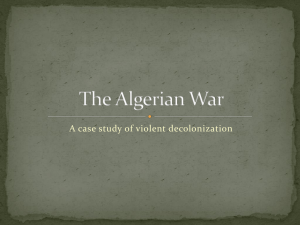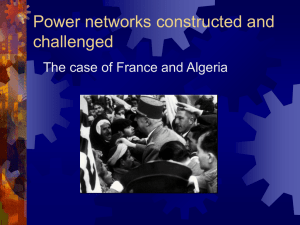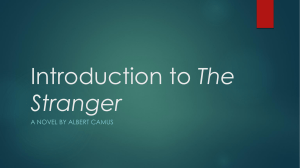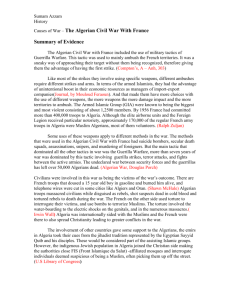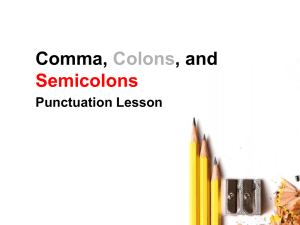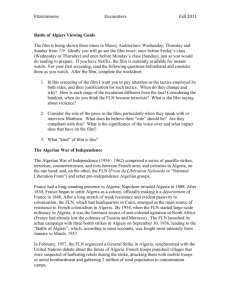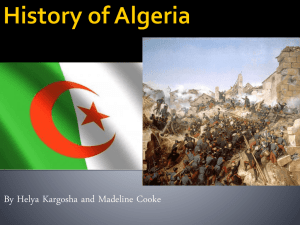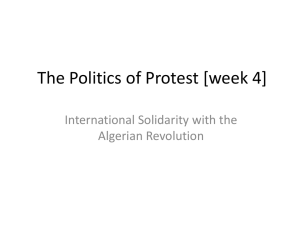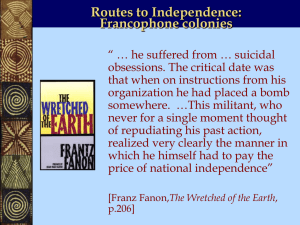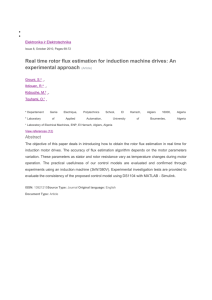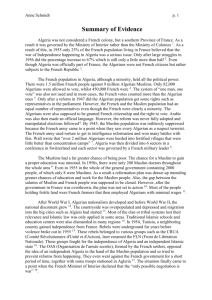Algeria - University of Warwick
advertisement
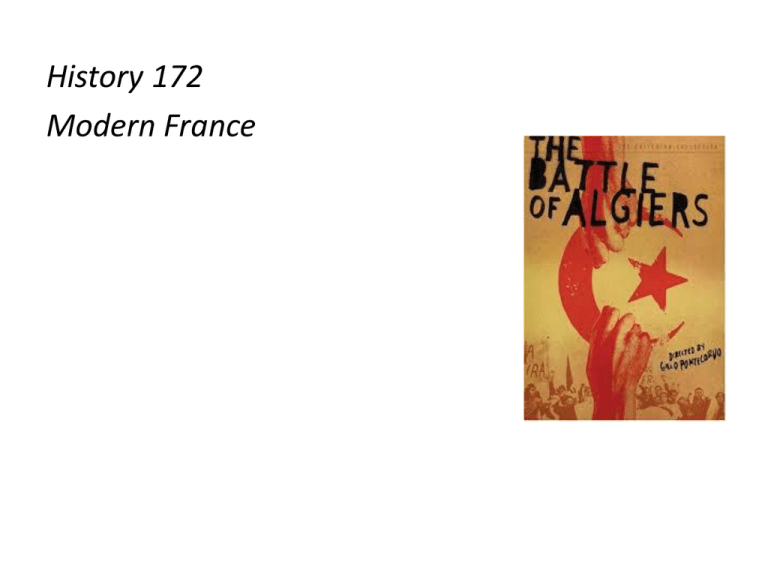
History 172 Modern France History 172 Modern France Decolonisation and The Algerian War (1954-1962) Algeria – not just a colony Under Ottoman rule for more than 300 years Conquered by Charles X 1830 Response to insult to French ambassador when he was whisked with a fly-swatter by the Dey Did not save Charles X from revolution. Algeria Algeria • Nearly four times larger than France Algeria • Population in 1830s – Approx 3 million, mostly Muslims – Reduced by nearly 1 million in first 30 years of war • Mass expropriations, torture, mass killings • Military/private companies prepare the colony for European exploitation – Factories and farms, with cheap local labour Tocqueville’s view • I think that all the means available to wreck tribes must be used… • I personally believe that the laws of war enable us to ravage the country and that we must do so by destroying the crops at harvest time, by making fast forays also known as raids the aim of which is to get hold of men or flocks. – Travail sur l’Algérie (1841) Rule • Civil administration (dominated by colons) • Mixed areas (colon representative, French governor) • Indigenous communes under the régime du sabre (rule of the sword) Colons • From Italy, Spain and France • French criminals (prisons) • Colons’ brutality criticized in France • Napoleon III: wanted to check colons’ dominance over Muslims, restricting the colons to coastal areas Coastal areas: Oran, Algiers, Constantine World War II • Under Vichy until 1943, when the Allies arrived • Colons supported Pétain • Muslims saw in Allied arrival hopes for selfdetermination (Atlantic Charter of 1941 had called for self-determination – Roosevelt pushed for this). • Muslim delegates approach Free France with political demands. Response from officials: ‘I don’t care about reforms. I want soldiers first’. Inequality persists after WWII • Average farm holdings – European 123.7 hectares – Muslim 11.6 hectares • Annual earnings from farms – European 2,800 pounds – Muslim 100 pounds Inequality • Annual earnings (1955) – European – Muslim 450,000 francs 16,000 francs • Some political gains under Blum (1930s) – 25K (of 6 million) Muslims receive citizenship – Jews receive citizenship but not Muslims in 1870 (the Crémieux decree) Inequality • Literacy rates after WWII – Only 15% literate – 1 in 5 boys can read French – 1 in 16 girls Sétif, 1945 • One year anniversary of France’s Liberation • Anti-colonial demonstrators clashed with police… shots fired, both sides kill • Subsequent attack on colons in the countryside by Muslims: 103 killed • Reprisals: massacres, arrests, colons vigilante violence, air-bombings. Deaths: 10-15K to 45K Sétif 1945 Post Sétif (1945-1954) • Initial calm after Sétif (leaders arrested) • OS (Opération spéciale) – Militant anti-colonialism – Ben Bella, leading figure • • • • • Brother died of wounds in WWI, fighting for France He himself fought for France in WWII Fought for De Gaulle, received medal Fought attempts to seize his father’s land, shot someone Went underground • CRUA – Comité révolutionnaire d’unité et d’action – Founded on day France is defeated at Dien Bien Phu – Revolutionary movement forged among Arab/Kabyle groups (both Muslim, traditionally hostile to each other) – ‘Arm, train, prepare!’ 1954: Founding of FLN Front de libération nationale • Grew out of prior factions and splits • Largely secular… opposed to political solutions (they had failed up until then to change the situation) • Rival liberation group: MNA (Mouvement national Algérien) • Civil war, in Algeria and France: 4000 killed in metropole All Saint’s Day, 1954 • Countrywide attacks on police, military and communications • Failure (started too soon in one area, which sent the alarm in advance of attacks in other areas) Egypt • Nasser supports FLN, allows them to use Cairo for planning • Suez Crisis: France, along with Britain, seeks to undermine Nasser and assert control of the Suez • US and USSR pressure Europeans to leave • Nasser stands… continues support of FLN Harkis • Algerians who sided with France. Why? – Already advantaged? – Tired of civil strife among Algerian resistance groups – hoped France could restore order • Harkis would be mercilessly targeted by FLN • Even today, Algerian hatred over the Harkis is a social and political hot issue • Despite efforts by Chirac (2001) to honour this group for fighting with the French, this refugee group in France is outcast by both the French and Algerians (they are forbidden entry to Algeria and do not receive the same level of benefits as French soldiers)… Targets and Factional Strife • Colons in the countryside, many of whom move to cities for safety • Bombings and assassinations of colons in Algiers • Meanwhile, Algerian liberation factions operating within France conduct ‘Café Wars’ – 4K-10K killed or wounded in France in targeted assassination attempts • Jacques Massu – Brigadier General, WWII hero – Torture, coercion in the Battle of Algiers (1957) 1957 • Massu attacks the Casbah neighbourhood of Algiers • Employs Nazi torture techniques • Electrocution of feet, throat and genitals • Won the battle of the Casbah but lost the war: repression breeds more resistance • Armed allies in war against ‘terrorism’ turn against France Irony: relaxed colonial control in other countries • France extends more political freedom to other colonial areas: Madagascar, Morocco, Tunisia, French Caledonia 1958 • Rumors of prime minister (Pflimlin) negotiating with rebels (French government had collapsed, yet again…) • Committee of Public Safety (colons) in Algiers mounts violent protest • Gaullist sympathizers in French Army in Algeria (Massu) seize Corsica in a coup… plan to invade Paris to force the installation of De Gaulle • Invasion of Paris cancelled: National Assembly puts De Gaulle into power ‘I understand you!’ De Gaulle to colons, 1958 Je vous ai compris! • De Gaulle travels to Algiers, confirms colons wishes to maintain colony • Soon, other French colonies are accorded freedom – De Gaulle maintains technological and economic assistance (post-colonial relationships) • Algeria? Not technically a colony, but a Department of France Colons strike back • OAS – Organisation de l’armée secrète – Unhappy with de-colonisation noises in France – Paramilitary – Organised in Franco’s Spain (fascist) – ‘Algeria is French and will remain that way!’ – Torture – Assassination attempt on De Gaulle (1962) – Attempts on Jean-Paul Sartre Savage War (1954-1962) • 1.5 million dead – – – – 25K French soldiers 10K civilians 12K FLN purges The rest, mostly Muslims (of about 8.7 million population in 1954) • Revolution – National? Socialist? Islam? • Civil War – Liberation factions – Harkis • Foreign war Intellectuals weigh in • Sartre – Justified FLN violence • Historical movement • High-minded principles are irrelevant • ‘The union of the Algerian people creates disunion of the French people’ • ‘Europe is springing leaks everywhere. De-colonisation has begun’ – Psychology • Identity formation is naturally violent – Cold War What this means for France? • Undermines universal republicanism • Massacres in Paris – October 1961 • Algerian defiance of curfew – February 1962 • Charonne Evian Accords • Recognized Algeria as an independent nation • Colons to have options: French or Algerian nationality Muslims in France • Universal republicanism disregarded in post-war nationality laws • Many formerly French Algerians lose their French nationality • Immigration from Algeria to France remains high in 1960s… status of Muslims as potential French citizens will remain problematic in coming decades. Irony: France needs Muslim workers • The hatreds of the Algerian War are not left in Algeria • Many groups come to France for work • Economically useful, culturally segregated • Was French republican universalism inherently hypocritical or did history throw it off course and into hypocrisy?
